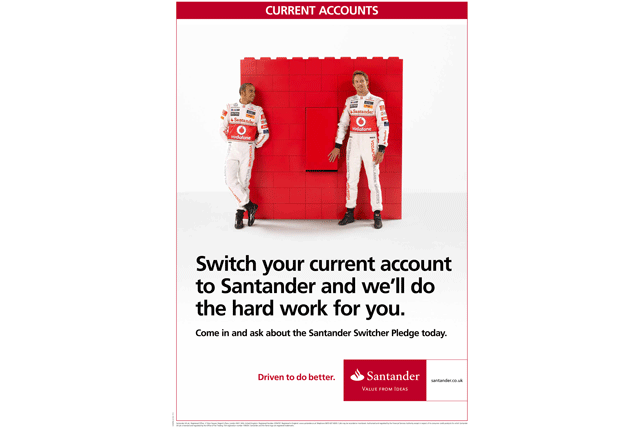
Nearly four years have passed since TV news reports showed queues of customers snaking from branches of beleaguered Northern Rock, desperate to reclaim their savings in fear that the bank would go under.
Chancellor George Osborne now believes that Northern Rock has recovered sufficiently to be re-privatised. Similarly, back in February, Lloyds Banking Group revealed it had returned to profit for the first time since slipping into partial state ownership in 2008, while the annual losses at RBS have dwindled from £24.3bn in 2008 to £1.1bn last year.
Surely, then, it is time to give Halifax's Howard a call about returning to the small screen? Perhaps not. The decision by Spanish bank Santander to launch a 'humble' marketing strategy this month suggests that consumers are not yet ready to forgive the banks they, as taxpayers, were forced to bail out.
Santander is in a unique position: it received no money from the British government, instead taking on assets from troubled building societies Bradford & Bingley and Alliance & Leicester. Yet a reputation for unsatisfactory customer service persists, and Santander was the second-most complained-about bank in the UK, after Barclays, over the second half of 2010.
Penance positioning
In response, Santander's UK brand and communications director, Keith Moor, has opted to ditch its previous tagline 'Together. We are Santander' for a more conciliatory tone. Along with its new line 'Driven to do better' - which ties in with its Formula One sponsorship - Moor said the bank needed to behave in a manner appropriate to the negativity of some customers' attitudes.
'We recognise that people have a lot of trust issues with banking, and that they need to see the banks being a bit more humble,' said Moor when launching the campaign last week.
RBS and NatWest, majority-owned by the taxpayer, were the first major UK banks to base ads on a supposed quest for self-improvement. NatWest's 14-point Customer Charter outlined plans to improve in all areas, including in-branch service, dealing better with complaints and participating in more community projects. A year on, the campaign shows no sign of ending.
Individual marketing campaigns seldom last longer than a few years, so financial-services marketers must surely resent pressure to tread a fine line in choosing potential brand messages. Yet banks have little choice but to use more bland messages in an effort to win back favourability, claims Eva Eisenschimmel, managing director for customers, brands, digital and telephone banking at Lloyds Banking Group.
'Trust is a long-term objective, built up over years and broken in a moment. Consumers still have deep emotional memories of the banking crisis, and those may still be there for a decade to come, before slowly fading. You wouldn't be a marketer worth your salt if you weren't engaged with this issue,' says the former EDF marketer.
'Bank advertising is very samey, slightly surrealist, with images of a better world. But part of that is to rebalance financial services from where it was before. We live in quite difficult times and you have to recognise this is the environment your staff and customers live in,' she adds.
However, given the increasing commercial success of UK banks since 2008, Eisenschimmel claims one must separate lack of 'emotional' trust from a growing 'practical' trust, which is leading consumers to invest in financial products and services.
James Clifton, chief executive at marketing agency Balloon Dog, and former head of WPP's HSBC account in North America, believes the best way to achieve the dual ambition of building a brand and winning consumer trust is through the marketing of genuine product innovations.
NatWest recently rolled out a campaign backing its Emergency Cash service, for customers who have lost their debit cards, while Barclaycard tweaked its 'Rollercoaster' TV ad to showcase its mobile payment service. Lloyds TSB's promotion of its Money Manager online banking service is another campaign that may have a similarly positive impact on perception.
'Simply saying you will change is no longer enough - in fact, it's getting a bit old. They need to demonstrate change,' argues Clifton. 'Both NatWest and Barclaycard's campaigns are demonstrable manifestations of change, not an empty statement that we will change because we have to, or we're just "nice people". It's time to stop talking and start doing.'
With consumers unlikely to forgive and forget the banking crisis soon, marketers must appeal to their practical motivations. The emotional healing process cannot, unfortunately, be hurried, no matter how exciting the creative concept.

